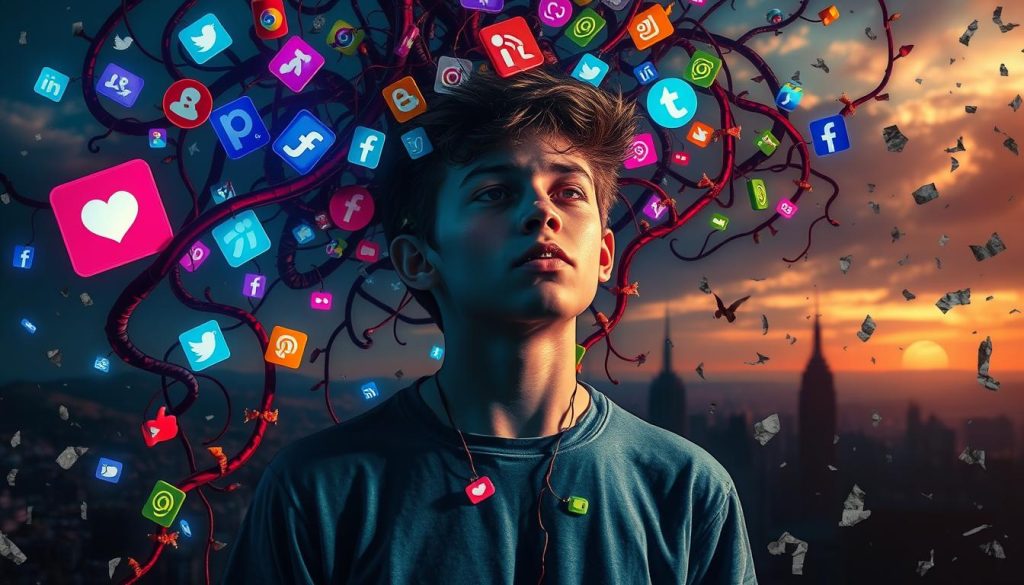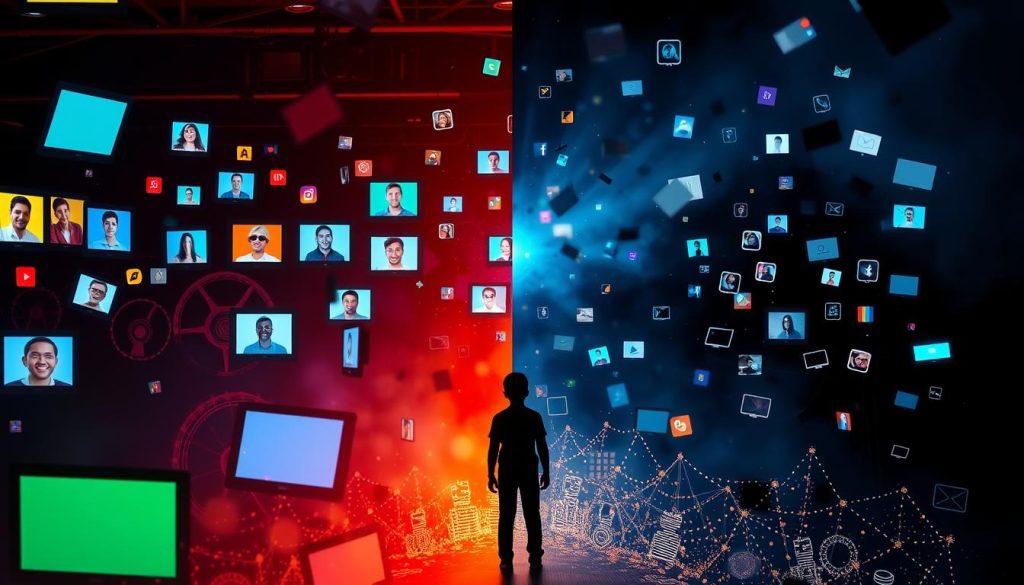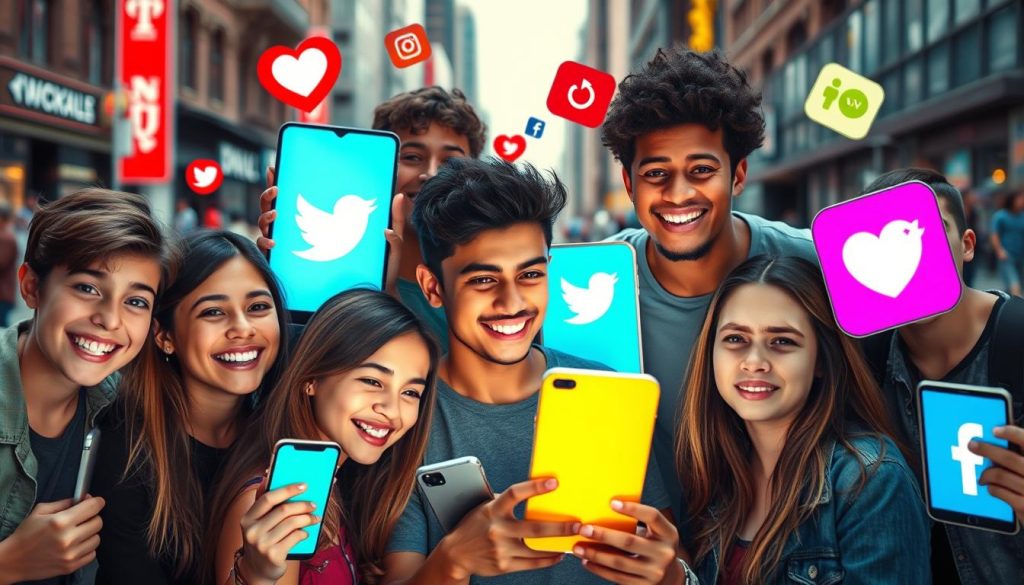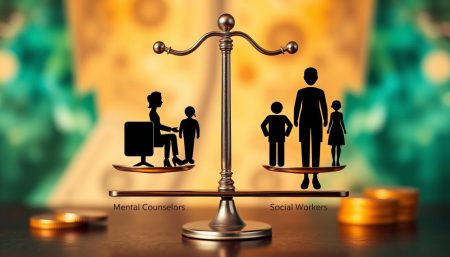In today’s world, social media is as common as breathing for teens. The effects of social media on the teen psyche are a big concern. We’re not just talking about how much time they spend online. We’re looking at how social media influences teenage development in many ways.
Studies show a wide range of experiences for teens. Some find it positive, while others face negative effects. The voices of teens themselves are at the heart of this discussion. They share their experiences with both online and offline life.
A big study has uncovered the complex effects of social media on teens’ mental health. This article aims to shed light on these findings. It wants to understand what matters most to today’s youth as they use social media.
Key Takeaways
- Understanding the multi-faceted relationship between social media and teen mental health is crucial.
- Teen perspectives provide authentic insights into how digital interactions influence their everyday lives.
- Critical examination of social media platforms can lead to enhanced support for teenage well-being.
- Recognizing the importance of fostering environments conducive to healthy teenage development in the digital age is key.
- Anchoring platform designs in prioritizing mental health over mere engagement is an ongoing challenge and necessity.
Exploring Teens’ Perspectives on Social Media and Mental Health
To understand how social media affects teens’ mental health, we need to hear from them directly. Their stories help us see the challenges they face online. They also guide us in creating better ways for them to use social media.
Why do teens’ perspectives matter in this discourse? Teens are the biggest users of social media. They live in a world that changes fast with new tech. Their experiences give us deep insights into how social media affects their lives and minds.
| Aspect of Social Media | Percentage of Teens Engaged | Reported Impact on Mental Health |
|---|---|---|
| Usage Frequency | 85% | Varied effects on mood and self-esteem |
| Content Interaction (like, share, comment) | 75% | Influence on social validation and anxiety levels |
| Online Community Participation | 58% | Positive and negative impacts on sense of belonging |
The table shows that teens are deeply involved with social media. It also shows mixed effects on their mental health. While there are good sides, the challenges they face are big and varied.
As we delve deeper into how teen view social medias impact on their mental health, it becomes evident that the platform is not merely a tool for connectivity but also a complex arena of psychological dynamics.
We will look into teens’ views on social media and mental health further. We will share personal stories and practical tips to help. It’s important to listen to teens and work together to make a healthier digital world for them.
How Teen View Social Medias Impact on Their Mental Health
Today’s teens face a world full of digital challenges and opportunities. This look into how social media affects their minds shows the impacts of digital life on teen mindset and the teenagers’ virtual world challenges.
Real Voices: Personal Accounts and Experiences
Teenagers share their varied experiences with social media. Some find connection and community, while others feel isolated and anxious. Real-life stories show how social media can both unite and pressure teens.
The Psychological Impact: Anxiety, Depression, and Self-Esteem
Studies show a link between social media and higher anxiety, depression, and self-esteem issues in teens. The need to keep up an online image and compare to others adds to these problems. This highlights the impacts of digital life on teen mindset.
Navigating the Digital Landscape: Coping Strategies and Support
Smart teens find ways to deal with the teenagers’ virtual world challenges. They limit screen time, do real-life activities, and get help from friends, family, and experts. Finding a balance in their digital lives helps them stay mentally healthy.

| Aspect | Impact | Coping Strategy |
|---|---|---|
| Anxiety | High | Guided meditation and unplugged hours |
| Depression | Moderate to high | Social support networks and professional help |
| Self-Esteem | Variable | Real-life achievements and hobbies |
The Dark Side of the Feed: Social Comparisons and Cyberbullying
Adolescents face many risks when they use online platforms. This part talks about two big issues: how social comparisons affect them and the dangers of cyberbullying.
Scrolling Towards Insecurity: The Trap of Social Comparison
Seeing perfect lives on social media can harm teens’ self-esteem. It makes them feel bad about themselves. This social media exposures impact teen mentality by making them always compare and doubt themselves.
Young users compare their lives to the perfect moments shown on social media. They often feel they don’t measure up. Since most content is only the best, teens get a wrong view of reality. This makes them feel not good enough.
The Harsh Reality of Cyberbullying: Victims Share Their Stories
Cyberbullying is a big risk for teens on social media. They face mean comments, hate, or being left out online. This can really hurt their mental health.
People who have been bullied online share their stories. They talk about the deep pain and lasting effects. Their stories show how important it is to have support online and offline. It helps teens feel valued beyond their online presence.
To learn more about how mental health is affected by online behaviors, check out this resource.
Adolescents and Social Networking Risks
Social media poses many challenges for teens, affecting their mental and emotional health. Issues like cyberbullying, privacy concerns, and addiction are big problems. These issues make the online world tough for young people.
Privacy is a big worry for teens on social media. They often share too much personal info. This can attract unwanted attention or even danger from strangers. Teens also face risks from seeing things they shouldn’t, like harmful content.
Social media can be addictive, leading to too much screen time. This can hurt teens’ health, sleep, and school work. It’s important to know these risks and find ways to protect teens.
| Risk Factor | Impact on Adolescents | Strategies for Mitigation |
|---|---|---|
| Privacy Concerns | Potential harm from oversharing personal information. | Education on privacy settings and thoughtful sharing. |
| Inappropriate Content | Exposure to harmful material that could influence behavior and beliefs. | Use of parental controls and monitoring of online activities. |
| Social Media Addiction | Neglect of physical activities, disturbed sleep, and poor academic performance. | Setting limits on usage, promoting offline activities. |
Parents and teachers need to step up to help teens. They should learn about the digital world teens use. They should talk openly about online dangers and encourage healthy online habits.
Youth Well-being and Online Platforms: A Delicate Balance
Digital landscapes are changing fast. This means the link between teen mental health and social media is getting stronger. It’s a mix of challenges and chances for keeping young people safe online. It’s key to find a balance to help our youth stay healthy in the digital world.
Maintaining Mental Health in a Connected World
Digital connections are everywhere, but they can be tough on teens’ mental health. Being online too much can cause digital fatigue, anxiety, and feeling overwhelmed. It’s important for teens to set limits on their online time.
Having breaks from screens and spending time in real life can really help. It boosts their well-being and lowers stress.
Positive Practices: Encouraging Digital Health and Hygiene
It’s vital to teach young people good digital habits for their mental and emotional health. Here are some tips for digital hygiene:
- Regular Digital Detox: Encourage teens to take breaks from social media and devices to rest and recharge.
- Mindful Consumption: Teach them to think about what they’re watching and reading online. Choose things that make them feel good and learn something new.
- Social Media Literacy: Help them understand how social media affects their mental health. Teach them to be smart about their online actions.
- Protected Privacy: Talk to them about keeping their privacy settings safe. Explain the long-term effects of their online actions.
By making these habits part of their daily life, teens can enjoy the internet while keeping their mental health safe. Finding a balance is the secret to doing well in today’s digital world.
Impacts of Digital Life on Teen Mindset
The world of online environments and digital media is changing fast. It’s shaping how teens grow up, both in their minds and in how they connect with others. The social media influence on teenage development is huge, affecting their focus, self-image, and friendships.
Teens are now creating their online identities. They work hard to show the world a perfect image, following the latest trends. But this can make them feel like they’re living two lives. It can hurt their mental health and how they see themselves.
- Extended screen time and decreased attention spans
- Pressure to present an idealized online self
- Anxiety from constant social comparison
The effects of social media on teen psyche get worse because of likes, comments, and shares. These digital nods can make teens feel good about themselves or not. It can make them question their worth and feel sad.
| Impact on Teen Psyche | Examples |
|---|---|
| Real vs. Virtual Persona Discrepancy | Creating overly curated online profiles that do not reflect true personality traits |
| Social Comparison and Anxiety | Scrolling through highly selective positive portrayals of peers’ lives, leading to feelings of inadequacy |
| Attention Span Reduction | Difficulty in focusing on prolonged tasks without checking social media updates |
It’s key to understand these effects to help teens use digital media wisely. We need to make sure their mental and emotional growth isn’t blocked by their online lives.

Social Media Influence on Teenage Development
Social media is now a big part of our lives. It affects how teens feel and act, especially in terms of emotional intelligence and online communities. This section looks into how digital platforms shape the emotional and social growth of teenagers.
Emotional Intelligence in the Age of Emojis
Teens use emojis and online text to share feelings. This helps them develop unique communication skills. It can improve emotional intelligence by offering many ways to express and understand emotions.
But, it also has its downsides. The nuances of face-to-face interactions can get lost in digital communication.
Fostering Growth: The Role of Digital Communities
Positive online communities are key for teens’ growth. They provide support and a sense of belonging. These communities help teens express themselves and find information that supports their mental health.
| Aspect | Benefit | Challenge |
|---|---|---|
| Emotional Expression | Broader range of emotive tools via emojis | Lack of non-verbal cues can lead to misunderstandings |
| Peer Support | Access to global support networks | Potential exposure to negative interactions |
| Identity Exploration | Freedom to explore diverse aspects of self | Risk of identity confusion without offline balance |
Social media has a big impact on teens. It brings both chances and challenges to their growth. Understanding these can help support teens in using digital media for their mental health and well-being.
Online Presence Repercussions for Youth
The impacts of digital life on teen mindset are complex. As young people’s digital footprints grow, they face both chances and challenges. Today, the online presence repercussions for youth can shape their future in school and work.

It’s key to understand how digital actions affect teens’ lives. Keeping an online presence can be both good and bad. It can open doors to new chances but also carry risks.
| Benefits | Challenges |
|---|---|
| Enhanced learning opportunities through digital platforms. | Risk of permanent digital footprints affecting future opportunities. |
| Connections with global communities fostering diverse perspectives. | Potential exposure to cyberbullying and online harassment. |
| Accessibility to online tutorials and resources for skill enhancement. | Privacy concerns that could compromise personal information security. |
| Platforms to showcase talents and achievements attracting positive attention. | Pressure to maintain a perpetually perfect online image. |
The impacts of digital life on teen mindset are vast. Social media is especially important. Digital literacy, parental guidance, and maturity play big roles in the online presence repercussions for youth. Teachers and parents need to help teens use the internet wisely, turning weaknesses into strengths.
Teenagers’ Virtual World Challenges
Social media is changing fast, affecting teens’ mental health and how they act. The mix of social media exposures impact teen mentality and teenagers’ virtual world challenges is complex. It includes worries like the Fear of Missing Out (FOMO) and the effects of online peer pressure.
Fighting FOMO: How Teens Deal with ‘Fear of Missing Out’
Many teens struggle with FOMO, feeling they must stay connected with friends. This constant need to check social media can cause anxiety and distract them. It can hurt their mental health and school work.
Teens’ battles with FOMO show how vulnerable they are to digital feedback. Things like likes and comments can make them question their success and happiness.
Virtual Peer Pressure: Staying True to Oneself Online
Teens face big challenges online, especially with identity and self-expression. They feel pressured to show a perfect image of themselves. This can make them feel not good enough and hurt their self-esteem.
They compare themselves to the edited lives of their friends. This can be very hard for them.
| Impact Area | Effects on Teenagers |
|---|---|
| FOMO | Increases anxiety, disrupts sleep, leads to lower academic performance |
| Virtual Peer Pressure | Distorts self-image, encourages conformity, impacts mental health negatively |
| Social Media Fatigue | Leads to withdrawal symptoms, decreased social activity in the real world |
Breaking the Cycle: How Families Can Support Healthy Social Media Use
Looking into how social media affects teens, it’s clear families must step in. They can help teens develop good online habits. This protects their well-being from the bad sides of social media.
Create Open Dialogue: Encouraging Conversations About Digital Use
Talking openly at home is key to tackling these issues. By sharing their digital lives, parents can grasp their teens’ struggles. They can then offer the right advice and support.
Setting Boundaries: Parents’ Role in Teen Media Consumption
Parents are crucial in setting examples and limits online. Managing screen time and content can boost mental health. It guides teens towards better online experiences.

| Strategy | Benefits | Implementation |
|---|---|---|
| Regular Check-ins | Increases awareness of online habits | Set a weekly discussion about social media use |
| Content Filters | Protects against harmful digital content | Use parental control tools to block inappropriate sites |
| Encouraging Offline Activities | Reduces screen time, promotes physical health | Plan family outings or engaging home activities |
Social Media Exposures Impact Teen Mentality
Social media affects many parts of a teenager’s life, from how they feel about themselves to their views of the world. It’s important to understand how social media influence on teenage development can help make online spaces safer. This influence, though subtle, can change how teens see themselves and others.
Content on these platforms can shape young users’ personal growth. Feeds are designed to show what’s popular, creating a bubble that limits views. This can make teens think they’re not meeting up to standards shown by influencers, leading to a warped view of reality.
| Impact Area | Example | Potential Risk |
|---|---|---|
| Self-Identity | Celebrity and influencer culture | Increased dissatisfaction and self-esteem issues |
| Worldview | Highly curated news and information | Development of biased perspectives |
| Social Behavior | Online interactions replacing face-to-face communication | Lack of real-world social skills |
Social networks are designed to keep users hooked. Alerts and endless scrolling make it hard to stop using them. This can lead to too much screen time, hurting sleep, exercise, and face-to-face interactions.
Teaching teens about digital and media literacy is key. Schools and parents must help them learn to think critically about what they see online. This knowledge helps teens use social media in a healthier way.
The Positive Spin: Can Social Media Also Aid Teen Mental Health?
In a world often focused on the negatives, a new story about social media’s impact on teen mental health is refreshing. It shows how social media can help, not just harm. This opens up a conversation on how these platforms can support and heal.
Inspiring Stories: Using Platforms for Positivity and Support
Social media is often seen as negative, but it also offers chances for positive interaction. Teens find comfort in sharing their thoughts, creative work, and getting support from others. Features like community groups and mental health resources help create a supportive online space.
- Connections with peers who provide emotional support and understanding
- Access to global communities that share similar interests or experiences
- Platforms that encourage positivity through user-generated content and collaborative projects
Countering the Negatives: Highlighting Beneficial Aspects of Social Networks
Social media connects teens worldwide, creating a unique support system. This can be especially powerful for those feeling isolated. By sharing stories of recovery and resilience, social media can become a tool for mental wellness.
- Real-time communication with friends and supporters can reduce feelings of isolation.
- Education about mental health through shared articles, stories, and resources.
- Increased awareness of mental health issues which can lead to greater self-advocacy and empowerment.

Conclusion
In this journey into the world of teens and digital media, we’ve uncovered a lot. We’ve seen how social media affects teen minds. Stories and studies show it can change how teens feel about themselves and their place in the world.
Young people have shared their experiences. They talk about how social media can hurt their self-esteem and mental health. But they also see it as a place to find support and build connections.
Social media is a complex issue. It can cause problems like anxiety and depression. But it also offers a chance to express oneself and find community.
The truth is, the impact of social media varies. It depends on the person, their online experiences, and their real-life support system.
It’s important for everyone to talk about teen mental health and social media. Parents, teachers, policymakers, and teens need to share their thoughts. This way, we can make better choices and support each other.
As we move forward, let’s understand social media’s role. It’s not just about the technology. It’s about how we use it and what we want to achieve.
FAQ
Q: How do teens view the impact of social media on their mental health?
A: Teens have different views on social media’s effect on their mental health. Some see it as a way to connect and express themselves. Others feel pressure from comparisons and deal with cyberbullying. The impact varies, with some feeling positive effects and others struggling with negatives.
Q: What are some psychological impacts of social media on adolescents?
A: Social media can lead to anxiety, depression, and low self-esteem in teens. The need to show a perfect image online and constant exposure to others’ highlights can harm their mental health.
Q: What are teenagers’ virtual world challenges?
A: Teens face challenges like cyberbullying, privacy issues, and fear of missing out. They also deal with peer pressure and the risk of addiction. Managing their online image and balancing digital and real-life activities are big challenges.
Q: How can teens navigate the risks associated with social networking sites?
A: Teens can stay safe by setting boundaries and using privacy settings. They should seek help when needed and learn about digital citizenship. Programs that teach critical thinking about online content are also helpful.
Q: In what ways can social media influence teenage development?
A: Social media shapes teens’ communication skills and emotional intelligence. It helps form their identities and affects their relationships. It also broadens their views through diverse content and communities.
Q: How does social media exposure impact a teen’s mentality and worldview?
A: Social media can shape teens’ beliefs and self-perception. It exposes them to a wide range of information and opinions. This can either broaden their views or trap them in an echo chamber of similar opinions.
Q: Can social media also aid teen mental health? If so, how?
A: Yes, social media can help teen mental health. It provides support, communication, and community. It allows for self-expression, raises awareness, offers resources, and connects teens with others.
Q: What role can families play in supporting healthy social media use among teens?
A: Families are key in promoting healthy social media use. They should have open talks, set guidelines, educate themselves about the platforms, and model good online behavior.
Q: How can teens balance their well-being with the use of online platforms?
A: Teens can balance online use by practicing digital hygiene. This includes taking breaks, engaging in offline activities, and being mindful of their time online. Using social media for learning and creativity is also beneficial.
Q: Are there positive practices to encourage digital health among adolescents?
A: Yes, there are positive practices. Encourage teens to have hobbies, promote physical activity, and create tech-free zones. Teach them about sleep, set screen time limits, and encourage critical thinking about online content.


















